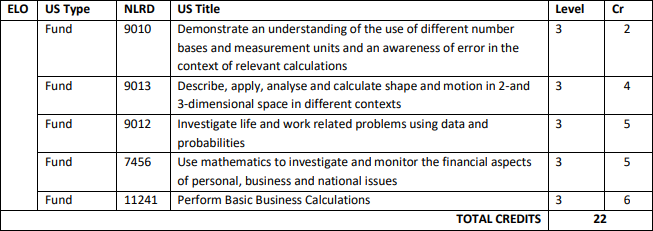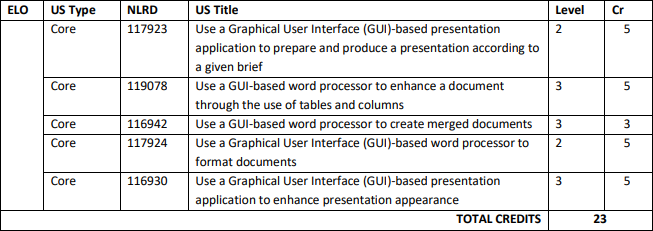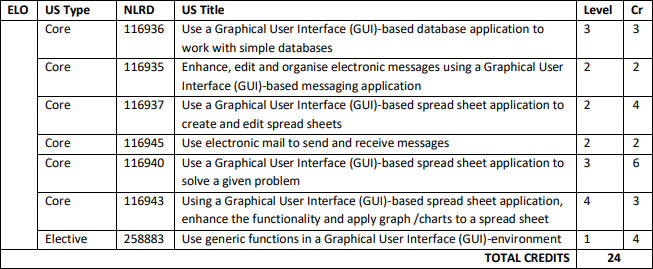SAQA ID: 61591(LP 49077)
NC: Information Technology: End User Computing Level 03
Title of Qualification:
SAQA ID: 61591(LP 49077) National Certificate: Information Technology: End User Computing Level 03
Duration of Qualification:
This programme consists of Fundamental and Elective Unit Standards as follows and will be covered over a period of one year
Total Number of Credits:142
Entry Requirements
n/a
Module 1 – Fundamental Mathematics

Module 2 – Fundamental Communication

Module 3 – GUI based applications Part 1

Module 4 – GUI based applications Part 2

Module 5 – The Internet

Module 6 – The Workplace

The purpose of the qualification is to build the knowledge and skills required by learners in End User Computing. It is intended to empower learners to acquire knowledge, skills, attitudes and values required to operate confidently in the End User Computing environment in the South African community and to respond to the challenges of the economic environment.
The qualification addresses the need in the workplace for nationally recognised qualifications, based on unit standards, which will allow learners with workplace experience in End User Computing to obtain recognition for prior learning.
The qualification provides a framework for learners to develop skills that will enable them to become competent in End User Computing. It introduces theoretical concepts of End User Computing and requires the application thereof, to develop a range of skills that will enable learners to be better-informed workers in their chosen industry. It provides a balanced learning experience that lays the foundation for access to further education, lifelong learning and to productive employment.
Who is the course intended for?
Learners working towards this qualification will find that the acquisition of competence in the unit standards, which make up the qualification, will add value to their work performance. This qualification is intended to enhance the provision of service within the field of Administration within all sectors. Through building day-to-day administration skills, as well as general operational competencies, the qualification ensures progression of learning, enabling the learner to meet standards of service excellence required within the administration field of
learning.
Learning assumed to be in place and recognition of prior learning.
Learning assumed to be in place and Recognition of Prior learning
It is assumed that the learner is competent in skills gained at the further education and training band up to NQF level 2. Further learning assumed is that learners are competent in End User Computing at NQF level 1.
Recognition of prior learning:
Many of the competencies used in the IT profession has traditionally been acquired through short courses and on-the-job training, which did not provide formal recognition (at a national level) of the knowledge and skills acquired. These competencies are still today viewed by most industries as invaluable but there is no national recognition. The nature of the IT field means that competence is developed experientially, therefore the assessment processes should recognise experience versus theoretical knowledge. Recognition of prior learning will now allow learners with these valuable competencies to be assessed and recognised formally.
Any learner wishing to be assessed may arrange to do so without having to attend any formal training. For recognition of prior learning the learner will be required to submit a portfolio of evidence of relevant experience, in a prescribed format, to be assessed for formal recognition.
Course Objectives
On achieving this qualification, the learner will be able to:
1. Demonstrate an understanding of applying Graphical User Interface (GUI)-based Word Processing Application skills in the Workplace.
2. Demonstrate an understanding of applying Graphical User Interface (GUI)-based Presentation Application skills in the Workplace.
3. Demonstrate an understanding of applying GUI-based Spreadsheet Application skills in the Workplace.
4. Demonstrate an understanding of applying GUI-based Electronic Mail Application skills in the Workplace.
5. Demonstrate an understanding of applying GUI-based Web Browser Application skills in the Workplace.
6. Improve Communication by combining communication skills with End User Computing skills.
7. Improve the application of mathematical literacy in the workplace, by better utilising End User Computing Applications.
8. Demonstrate an understanding of the use of Information Communications & Technology (ICT) in an organisation & the impact it has on societies
